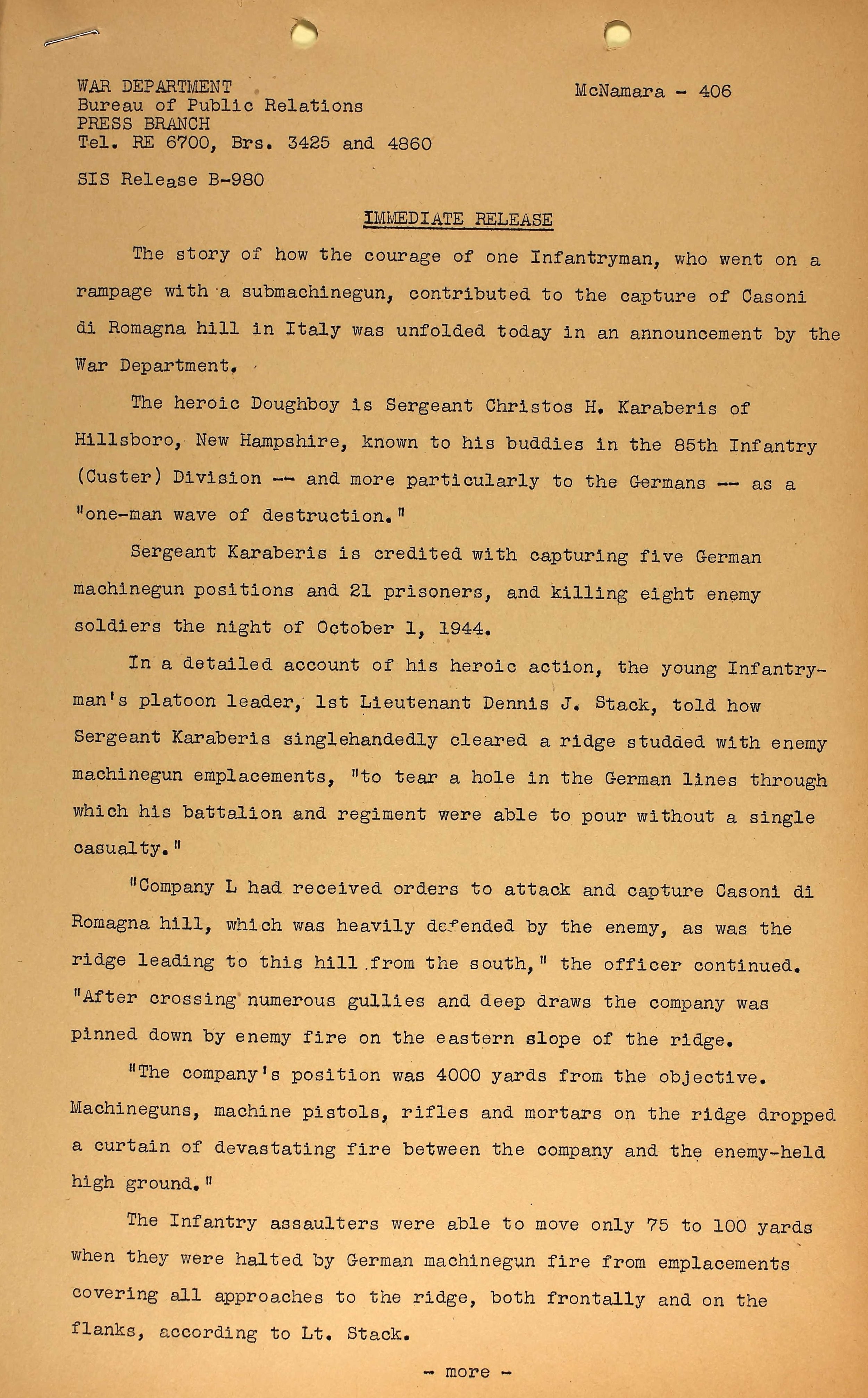Chris Carr
Christos was born in Manchester, New Hampshire, on the 16th of September 1914. Other than knowing he grew up in Manchester, being employed as a fisherman, and being divorced with no dependents, not much else is known about his early life. By the time he was 28, Christos enlisted in the US Army and within two years was deployed to Europe in support of World War 2. It was his actions with the 337th Infantry, 85th Infantry Division that would later earn him the Medal of Honor. The citation reads:
Leading a squad of Company L, he gallantly cleared the way for his company's approach along a ridge toward its objective, the Casoni di Remagna. When his platoon was pinned down by heavy fire from enemy mortars, machine gun, machine pistols, and rifles, he climbed in advance of his squad on a maneuver around the left flank to locate and eliminate the enemy gun positions. Undeterred by deadly fire that ricocheted off the barren rocky hillside, he crept to the rear of the first machine gun and charged, firing his submachine gun. In this surprise attack he captured eight prisoners and turned them over to his squad before striking out alone for a second machine gun. Discovered in his advance and subjected to direct fire from hostile weapons, he leaped to his feet and ran forward, weaving and crouching, pouring automatic fire into the emplacement that killed four of its defenders and forced the surrender of a lone survivor. He again moved forward through heavy fire to attack a third machine gun. When close to the emplacement, he closed with a nerve-shattering shout and burst of fire. Paralyzed by his whirlwind attack, all four gunners immediately surrendered. Once more advancing aggressively in the face of a thoroughly alerted enemy, he approached a point of high ground occupied by two machine guns which were firing on his company on the slope below. Charging the first of these weapons, he killed four of the crew and captured three more. The six defenders of the adjacent position, cowed by the savagery of his assault, immediately gave up. By his one-man attack, heroically and voluntarily undertaken in the face of tremendous risks, Sgt. Karaberis captured five enemy machine-gun positions, killed eight Germans, took 22 prisoners, cleared the ridge leading to his company's objective, and drove a deep wedge into the enemy line, making it possible for his battalion to occupy important, commanding ground.
Christos received the Medal of Honor from President Truman on the 12th of October 1945, in a ceremony at the White House with fourteen others, to include Desmond Doss. He was discharged after the war and had difficulty finding work for about two years, due to injuries he had sustained from the war, to include three weeks of temporary blindness. Christos was finally able to get a job as a bus driver with the United Traction company in Albany, New York. He re-enlisted in the Army in September of 1948 and worked as a recruiter, though he continued to suffer from service-connected injuries. I am unsure when he was discharged from the Army, but one source lists him getting a job with Northrop Aircraft Company in 1951 and another simply lists 1953. I am also not certain as to when, but Christos legally changed his name to Chris Carr, was married to Juanita, and the couple had one son and one daughter. Chris Carr died on the 16th of September 1970, at the age of 56 and he is buried with his wife in the Los Angeles National Cemetery: Section 275, Row G, Grave 15.








![Fifteen members of the Army Ground Forces stand on the White House lawn after being presented the Congressional Medal of Honor by President Harry S. Truman (not pictured). From left to right: Sergeant Christos H. Karaberis [Chris Carr], Sergeant Fr](https://images.squarespace-cdn.com/content/v1/5c8d0f2d34c4e2f9439e823f/1666480467358-I330SL76G9IZWTC643L3/CaptJamesBurt.jpg)




